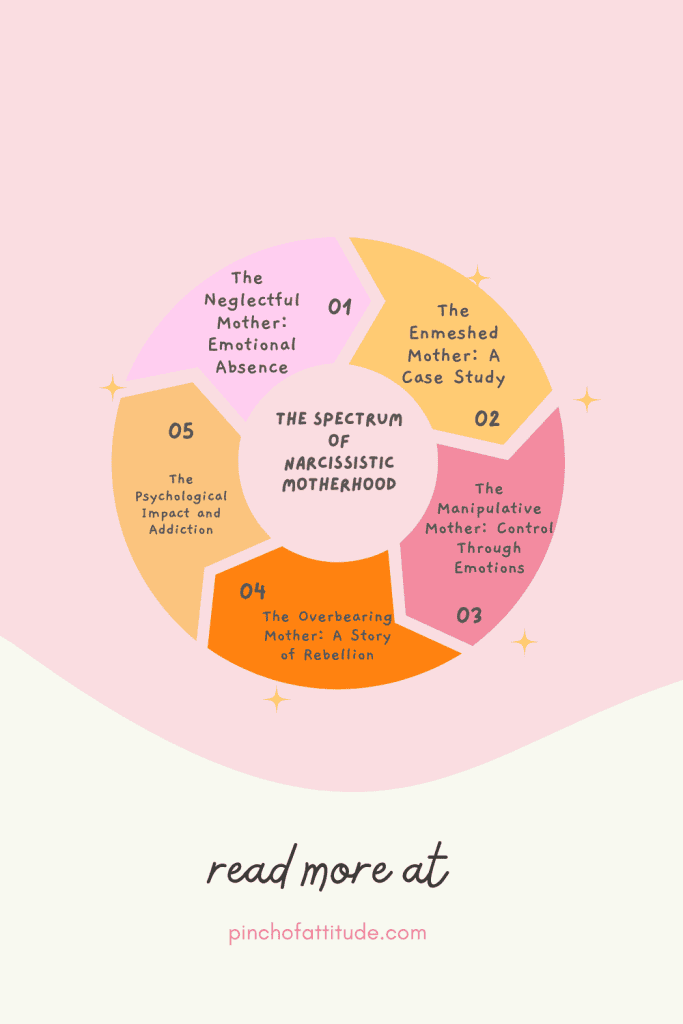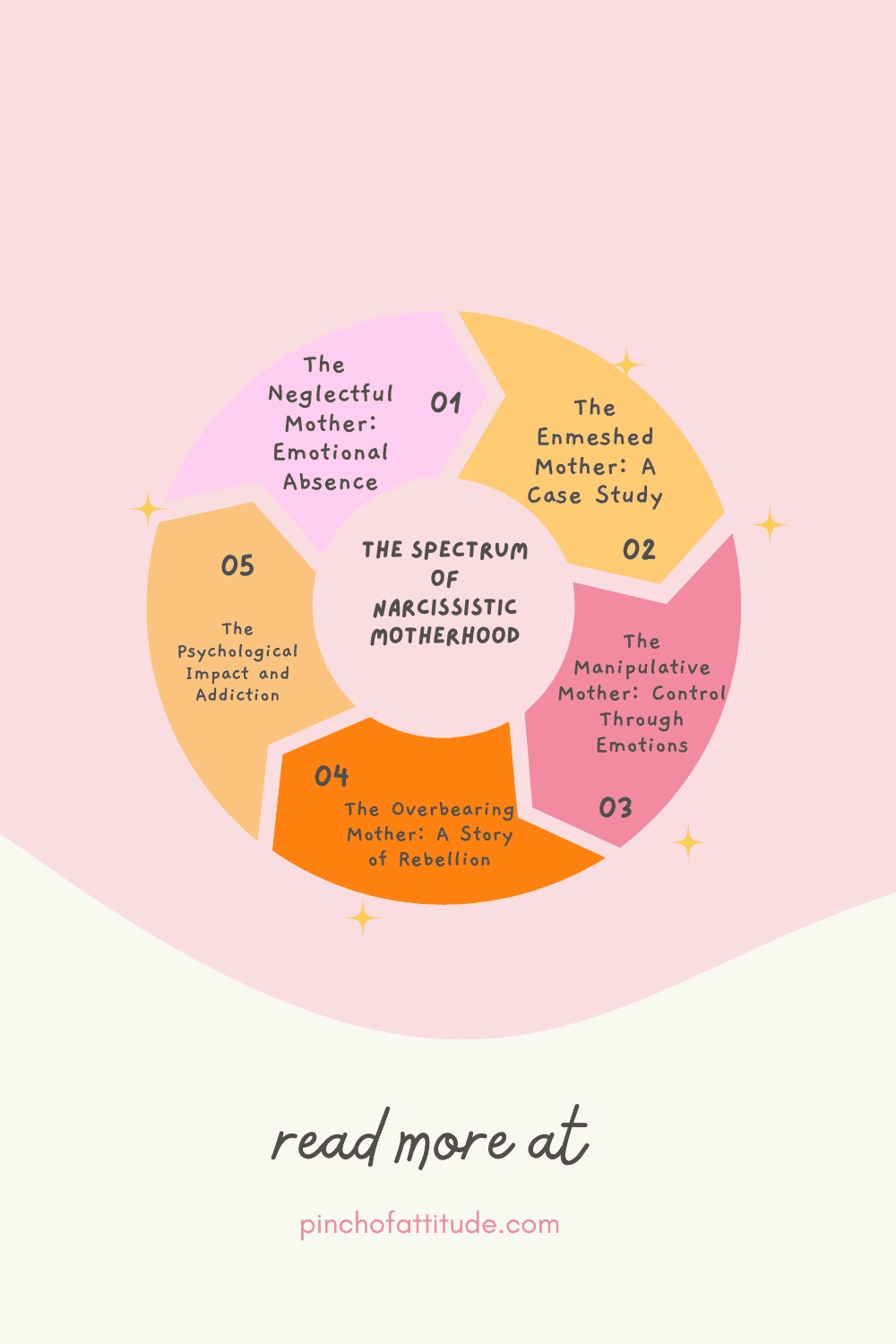As I sit in my office surrounded by the stories and journeys of those we’ve helped, I can’t help but reflect on a recurring theme that often emerges in our discussions about addiction – the profound impact of a narcissistic parent, especially a mother.
In exploring the various types of narcissistic mothers, I’ve come to realize how these complex relationships can cast long shadows, influencing patterns of behavior that often lead to addiction. However, this article is not just a summary of my observations.
It’s a personal study into the intertwining of maternal narcissism and addiction. On top of that, it’s also an exploration backed up by research to shed light on a topic that remains shrouded in misunderstanding and stigma.
Table of Contents
Understanding Narcissism in the Maternal Role

From my years of experience in addiction recovery, I’ve come to understand that narcissism, particularly in a maternal role, is a complex and multi-dimensional issue. It’s far more than just self-absorption or vanity.
It’s a deep-rooted psychological pattern characterized by an inflated sense of one’s importance, a desperate need for excessive admiration, and often a concerning lack of empathy for others.
When these traits are present in mothers, they can significantly disrupt the natural bond and nurturing process critical in early childhood development. In many of the cases I’ve encountered during my career, the types of narcissistic mothers have varied.
Still, the impact on their children’s psychological well-being and later susceptibility to addiction has been consistently profound.
These mothers, often unaware of their condition’s impact, can leave emotional scars on their children that last well into adulthood. These patterns shape their kids’ responses to stress, self-esteem, and overall view of relationships.
The Narcissistic Mother and Family Dynamics
Our parents’ role in shaping our lives extends far beyond what we perceive. In families where a mother exhibits narcissistic traits, the dynamics can be particularly complex and challenging.
These types of narcissistic mothers often create an environment where children grow up feeling that their value is tied to how well they meet their mother’s needs or expectations. This dynamic can lead to children developing a skewed sense of self, where their emotions and needs are consistently marginalized.
As a result, these children might grow up feeling inadequate or overly dependent on external validation. That can make them more susceptible to addictive behaviors as they seek out ways to cope with these deep-rooted feelings.
In my time working with individuals from such backgrounds, I’ve seen firsthand how the influence of a narcissistic mother can silently but significantly shape a person’s entire life course.
The Spectrum of Narcissistic Motherhood
As I explore deeper into the complexities of maternal influence, I will uncover the varied types of narcissistic mothers and their profound impact on their children’s lives. However, this exploration is personal to me, as I’ve seen how these distinct maternal traits shape emotional development and contribute to patterns of addiction.
The Neglectful Mother: Emotional Absence
The neglectful mother often stands out in my encounters with various family dynamics. This mother, characterized by her emotional detachment, leaves a profound void in her children’s lives.
Her absence is not just physical but deeply emotional. Children in these environments frequently find themselves desperately seeking attention and affection elsewhere.
Often, this search leads them down risky paths, including substance abuse. They are trying to use substances to fill the emotional gap left by their mother.
These children typically grow up feeling unseen and unheard, which can severely impact their self-worth and decision-making in adulthood. Overcoming these deep-seated feelings of neglect often requires a journey of self-discovery and building new, healthier emotional connections.
The Enmeshed Mother: A Case Study
Regarding narcissistic mothers, the enmeshed mother stands out distinctly. This type of mother often overshadows her child’s identity, creating a relationship where boundaries are blurred or non-existent.
Children in these scenarios frequently struggle to carve out their own identities. Their sense of self becomes entangled with their mother’s needs and expectations.
In one particular case from a facility I worked in, we encountered a young woman whose journey to independence was hindered by her enmeshed mother.
Her struggle was not just about overcoming addiction. It was also about learning to be fearless in establishing her individuality.
It was a path that required her to bravely step out of her mother’s emotional shadow and assert her own.
The Manipulative Mother: Control Through Emotions
The manipulative mother presents another challenging dynamic. Her tool of choice is emotional manipulation – using guilt, obligation, or fear to control her children.
Growing up under such influence, children often struggle to establish their sense of self. That is because their mother’s manipulative tactics constantly overshadow their emotions and needs.
This manipulation can lead to a range of issues in adulthood, including addictive behaviors, as individuals grapple with developing autonomy and self-worth. Breaking free from this manipulation often involves recognizing and countering these unhealthy patterns.
Even though this process can be very challenging, it is also liberating at the same time.
The Overbearing Mother: A Story of Rebellion
The overbearing mother is another archetype that profoundly affects her children. Her style is characterized by intense control over every aspect of her child’s life, leaving little room for independence.
This overbearing nature often breeds a sense of suffocation in children. It usually sparks a desire to break free.
I’ve witnessed how this urge for freedom can manifest in rebellious behaviors, including addiction, as a form of asserting individuality. These children typically grow up in an environment where their choices are constantly dictated, leading to a suppressed sense of self.
Rebelling against such control is not just an act of defiance, it’s a struggle to find and express one’s identity.
Overcoming the impact of an overbearing mother often involves redefining oneself and establishing personal boundaries. These are important steps towards healthy independence.
The Psychological Impact and Addiction

The psychological impact of growing up with a narcissistic mother can be both deep and enduring.
From my observations, I’ve seen how this upbringing often leaves children grappling with issues of self-esteem and struggling to form healthy relationships. Many carry the burden of depression and anxiety into adulthood.
These emotional challenges, deeply rooted in their childhood experiences, can lead individuals down the path of addiction. It’s a coping mechanism to deal with the overwhelming feelings of such a tumultuous upbringing.
I’ve learned that the key to breaking this cycle is not just in treating the addiction but in addressing these underlying emotional wounds. It’s important to recognize these patterns and not allow yourself to be a victim of your past.
Overcoming addiction in this context is about more than just physical sobriety. It’s also about healing emotionally and rebuilding a sense of self-worth that was eroded in the shadows of a narcissistic mom.
Personal Stories of Recovery and Resilience
While working with individuals from various backgrounds, I’ve witnessed some truly inspiring stories of recovery and resilience. One such story that truly resonates with me is that of a young woman who grew up with an enmeshed mother.
Her journey was not just about battling addiction, it was about untangling her identity from her mother’s overpowering influence. It was about learning to stand alone and find her voice in a life where she had always felt overshadowed.
Another poignant story is of a young man who came to realize that he had been living as a narcissistic family scapegoat. His path to recovery involved unraveling the layers of manipulation and control he had experienced and learning to value his perspective and needs.
These stories are powerful reminders of the human spirit’s capacity to overcome adversity. More importantly, they emphasize the importance of addressing not only the physical aspects of addiction but also the emotional and psychological wounds that often lie beneath.
Strategies for Overcoming Narcissistic Influence
In my journey guiding individuals who’ve endured the influence of narcissistic mothers, I’ve learned the critical importance of strategies to start fresh after hitting rock bottom. Even though it is hard, many successful stories of recovery show that everything is possible with the right mindset.
On top of that, I will also use the next sections to share the approaches that have proven effective in overcoming and thriving beyond the challenges of such a unique upbringing. These strategies are about more than recovery, they’re a pathway to empowerment and a chance to reclaim control over one’s life.
Recognizing and Acknowledging the Impact
In my experience, the first step in healing from the effects of a narcissistic mother is recognizing and acknowledging her impact.
This realization can be a significant moment. It’s about understanding how this unique upbringing has shaped one’s behaviors and life choices, especially when it comes to addiction.
This awareness is often accompanied by a range of emotions, from anger to sadness, but it’s an important part of the journey towards healing. I emphasize to those I work with that acknowledging these experiences is not about placing blame but about gaining clarity.
It’s a necessary foundation for building a new path where past experiences inform but do not dictate the future.
Understanding Therapeutic Approaches to Healing
In addressing the complexities of this form of upbringing, I have found various therapeutic approaches incredibly beneficial.
Personalized therapy sessions allow individuals to explore and understand their experiences in a safe and supportive environment. Meanwhile, group therapy provides a sense of community and shared understanding.
Techniques like cognitive-behavioral therapy help in rewiring thought patterns and behaviors. In addition, holistic methods like mindfulness and meditation can help individuals find balance and peace.
Each of these approaches plays a role not just in addressing the symptoms of addiction, but in healing the deeper emotional wounds inflicted by a narcissistic upbringing.
Building Resilience and Coping Mechanisms
Another important thing I’ve learned during decades of my work is that building resilience against the influence of different types of narcissistic mothers is key to long-term recovery. This process involves developing robust coping mechanisms that empower individuals to face life’s challenges without reverting to addictive behaviors.
These mechanisms are helpful tools in the journey toward emotional independence and self-discovery. Here’s what to focus on:
- Learning to set and maintain healthy boundaries can help create a personal space where one’s needs and emotions are respected.
- Techniques like mindfulness and deep breathing aid in managing emotional responses, reducing the likelihood of impulsive actions.
- Engaging in supportive relationships and communities provides a sense of belonging and understanding, which is invaluable.
- Regular self-care activities enhance overall well-being, making coping with stress and triggers easier.
Each of these strategies plays a significant role in overcoming the challenges posed by growing up with a narcissistic mother. They are not just about coping, but also about thriving and transforming one’s life into a journey of growth and self-empowerment.
A New Dawn of Understanding and Healing
When reflecting on the journey through the types of narcissistic mothers and their impact, I’ve grown to appreciate the resilience and strength of those who’ve faced such challenges.
This exploration isn’t just about understanding the complexities of maternal narcissism, it’s about recognizing the capacity for healing and growth in its aftermath. The stories of those who’ve navigated these turbulent waters are testaments to the human spirit’s ability to overcome.
If you’re grappling with the shadows cast by a narcissistic mother, remember that this understanding is the first step towards a more empowered future.
It’s not just about overcoming the difficulties these types of mothers impose, it’s about rewriting your story with hope and optimism and defeating the generational trauma. So accept this knowledge as a catalyst for change, and let it guide you towards healing and self-discovery.




